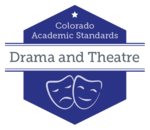You are here
2020 CAS - Drama and Theatre Arts Standards Introduction
![]()

On This Page
Standards Online
Purpose of Drama and Theatre Arts
“The stage is not merely the meeting place of all the arts, but is also the return of art to life.” --Oscar Wilde
“Too often, we glimpse the outlines of a scene and fail to notice the details that fill it in, making it truly interesting and unique.” --Eric Booth
Theatre Arts are Important to Life and Learning
Theatre arts are a universal force in the everyday life of people around the world. This force connects each new generation to those who have gone before. Students need theatre arts to make these connections and to express the otherwise inexpressible. Theatre, the imagined and enacted world of human beings, is one of the primary ways children learn about life – about actions and consequences, customs and beliefs, and others and themselves.
Theatre arts benefit the student because they cultivate the whole person, gradually building many kinds of literacy, including innovations in technology, while developing intuition, reasoning, imagination, and dexterity into unique forms of expression and communication. Theatre honors imagination and creativity, and students who engage in theatre benefit from learning these skills and many others that prepare them for the 21st century. Additionally, as they work at increasing their understanding of the challenges presented by theatre arts, they prepare to make their own contributions to the nation's storehouse of culture. The theatre process also is important for a student’s individual growth. A strong and clear sense of the theatre process, which takes the creative theatrical act from inception to completion, teaches the importance of follow-through and responsibility.
Theatre arts have both intrinsic and instrumental value. That is, they have worth in and of themselves and also can be used to achieve a multitude of purposes such as to present issues and ideas, to teach or persuade, to entertain, to design, to plan, and to beautify. Students grow in their ability to comprehend their world when they learn theatre arts. As they create dances, music, theatrical productions, and visual works of art, they learn how to express themselves and how to communicate with others. Because theatre arts offer the continuing challenge of situations in which there is no standard or approved answer, those who study the arts become acquainted with many perspectives on the meaning of "artistic value." The modes of thinking and methods of theatre arts disciplines can be used to illuminate situations in other disciplines that require creative solutions. Attributes necessary to the arts such as self-discipline, collaboration, and perseverance transfer to the rest of life.
The more students live up to these high expectations, the more empowered our citizenry becomes. Indeed, helping students meet these standards is among the best possible investment in the future of not only our children, but also our country and civilization.
Prepared Graduates in Drama and Theatre Arts
- Theatre artists rely on intuition, curiosity and critical inquiry.
- Theatre artists work to discover different ways of communicating meaning.
- Theatre artists refine their work and practice their craft through rehearsal.
- Theatre artists allow awareness of interrelationships between self and others to influence and inform their work.
- Theatre artists make strong choices to effectively convey meaning.
- Theatre artists develop personal processes and skills for a performance or design.
- Theatre artists share and present stories, ideas and envisioned worlds to explore the human experience.
- Theatre artists reflect to understand the impact of drama processes and theatre experiences.
- Theatre artists' interpretations of drama/theatre work are influenced by personal experiences and aesthetics.
- Theatre artists apply criteria to investigate, explore and assess drama and theatre work.
- Theatre artists critically inquire into the ways others have thought about and created drama processes and productions to inform their own work.
Standards in Drama and Theatre Arts
Standards are the topical organization of an academic content area. The three standards of drama and theatre arts are:
1. Create
The creation of drama and theatre is a demonstration of learned skills in forming new theatrical works, interpreting theatrical works for performance and design, and developing characters and analyzing roles.
2. Perform
The theatre process is a product of the knowledge and essential skills gained in the study of theatre toward the expression of the human experience in story, movement, speech, and staging for an intended audience.
3. Critically Respond
An informed literacy, thoughtful critique, and cultural research are key aspects of theatre arts study. Responding focuses on the artistic and scientific knowledge of conventions, cultures, styles, genres, theories, and technologies needed to know better choices and best practices.
Purpose of Fundamental, Advanced, and Professional Pathways in High School:
In order to meet the basic needs of all students, the advanced needs of those engaging theatre arts as a focus area and the needs of those pursuing careers in theatre, the standards review subcommittee developed Fundamental, Advanced, and Professional pathways.
The Fundamental pathway describes students who have limited interest in theatrical performance or theatre-related vocations, or whose interest lies within other aspects of theatre-related vocations, such as acoustic and structural engineering, advertising and marketing, event management, fashion design, mass communications, or publishing.
The Advanced pathway is designed to engage students that demonstrate a dedicated interest in the art form to explore connections throughout their immediate community and the world at large, providing intentional opportunities for students to engage with Theatre Arts skills and concepts that reach far beyond the stage.
The Professional pathway is directed at students who intend to pursue postsecondary education or vocation in theatre, which might lead to careers in theatre education, performance, technical production, theater management, or other theatre-related areas. The expectations in the Professional pathway meet all of the prepared graduate competencies with a much higher degree of rigor appropriate to the expectations of postsecondary and career theatre opportunities.



Connect With Us





